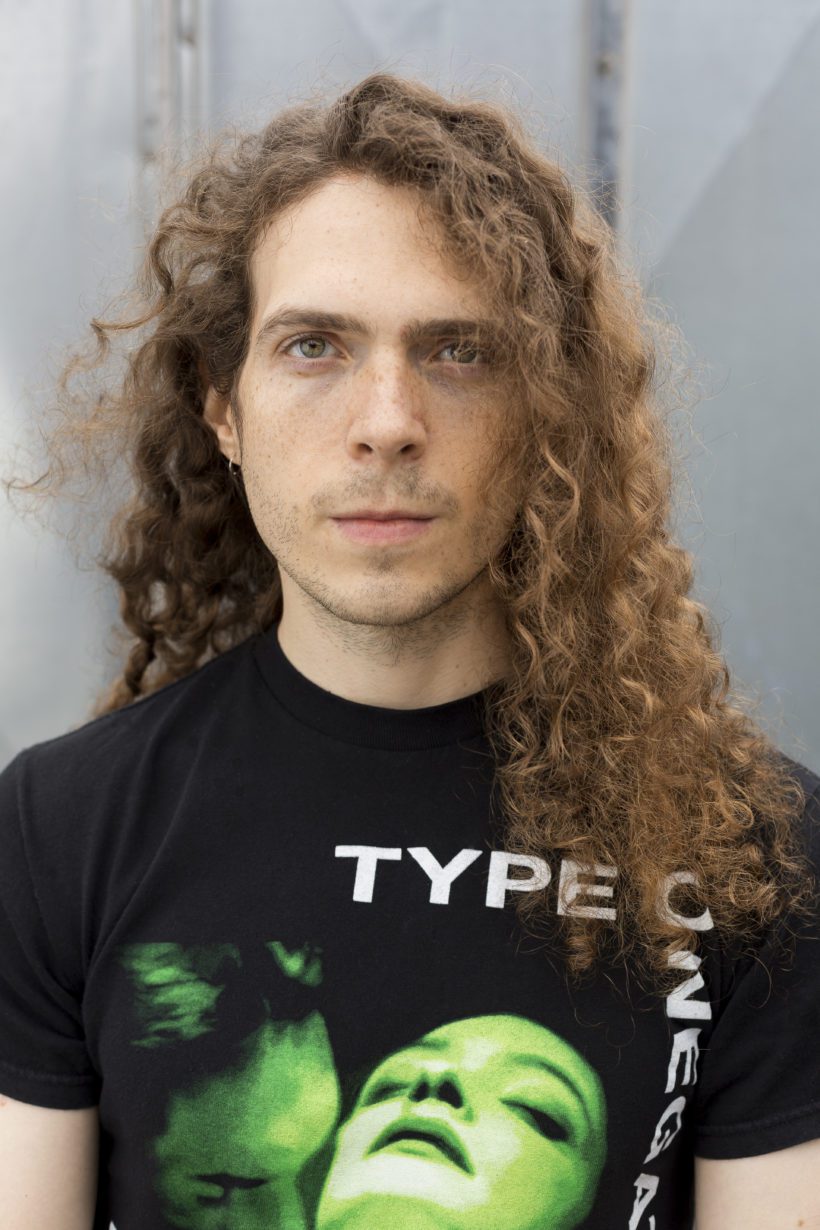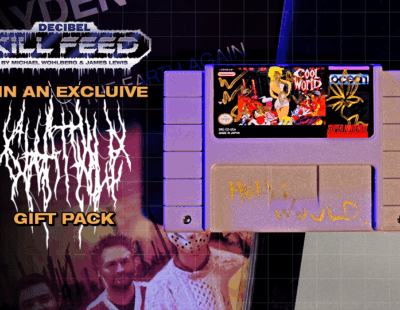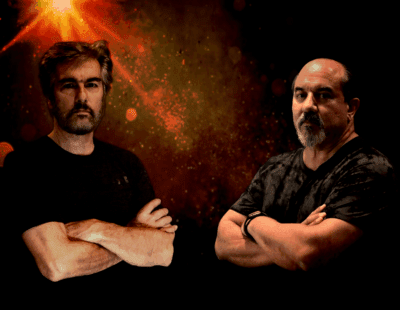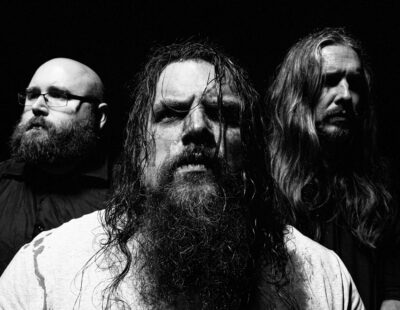
If you were working on the bleached-bone barges of Hades, you’d want someone expertly supervising. You know, to optimize soul-transfer quality, making sure everything’s running smoothly, and that the reaper-steered ferries aren’t on a collision course while creeping down the rivers Styx and Acheron. Well Damian Herring is that eye in the underworld sky, manning the control panel. As vocalist/guitarist of Philadelphia death metal brotherhood Horrendous, he earned Decibel‘s album of the year honor (2015’s Anareta), and finished in the top three the year prior (Ecdysis). But when Horrendous’ twisted tunes aren’t spawning stillborn gods, he’s working at his own Subterranean Watchtower Studios.
Described as a one-stop studio that “provides professional-quality recording, mixing, and mastering services,” Subterranean Watchtower has worked with knockout talent like Father Befouled, Sentient Horror, and Blood Incantation. If you’re a death metal fiend, it’s likely Herring’s fingerprints are on a release you jammed fuckin’ hard over the past few years. Like checking out a movie because of the director at the helm, if you see Herring’s name on a release that’s reason enough to press play. Herring’s pedigree and vantage point from the metal underground makes Subterranean Watchtower a worthy investment for bands and labels seeking help with mixing, mastering, and more.
After Horrendous blessed the buzzed masses with a grin-inducing set at the Decibel Metal & Beer Fest, we caught up with Herring about his work at Subterranean’s Watchtower’s control desk. Check out the interview below while blasting Anareta, and learn about Subterranean Watchtower’s unique set-up and the mistakes bands make when hiring audio engineers. We also couldn’t help but ask about the upcoming Horrendous record from Season of Mist. Tune in below.
When did you first develop an interest in pursuing audio recording?
Damian Herring: I got into recording right when I started playing guitar. I was about 13 or 14 and needed a way to capture my musical ideas. Recording was the obvious answer, and luckily my oldest brother had left a 4-track Tascam mixer/tape recorder and an SM57 at home when he left for college. I learned how to connect that mixer to a computer and over time I started writing multi-layered songs on my own with a DAW (digital audio workstation). From there, wanting to make my music sound better, I became even more interested in learning about the whole recording and mixing process. Before I knew it, production became a true passion, and even more fascinating to me than writing music itself. In fact, I would sometimes write just so that I could record and experiment/work on my skills haha.
It looks like Subterranean Watchtower has been active for 10 years. Who were the first artists that trusted you with their albums?
DH: Other than a couple local bands in high school, the first band I worked with was my own. It was my work on the Horrendous demo that ultimately lead to Patrick Bruss (Crypticus) introducing me to Decrepitaph and Father Befouled. This was the MySpace days, so I could be off, but as far as I can remember, those are the first two non-local bands I worked with.
Which engineers, producers, or records have inspired your approach at Subterranean Watchtower?
DH: In general, I’d say I have always been more inspired by certain albums or tones than by engineers specifically, since I hardly ever paid much attention to who produced what. Sometimes the production blows you away despite the music. And sometimes, if you love an album musically, you come to appreciate its production afterwards. Regardless, there’s no denying the impact Dan Swanö, Tomas Skogsberg, Fredrik Nordström, Scott Burns, etc., have had on me. The whole Sunlight Studios sound/scene was the inspiration behind my approach when I first got serious, but I was also heavily influenced by early In Flames (The Jester Race in particular), At the Gates’ Slaughter of the Soul, Carcass’ Heartwork, pretty much any Death material, Edge of Sanity, and Bloodbath’s Resurrection Through Carnage. I used to hang out on the Andy Sneap Ultimate Metal forum, so there’s got to be a bit of osmosis there, too. The whole vibe and atmosphere of early death metal (regardless of specific scene) and melodic black metal has continued to influence my productions, despite the fact that I’m simultaneously pursuing clarity and high-fidelity. For the most part, it’s the albums I’ve enjoyed listening to the most that have had the biggest impact on my approach as an engineer.
Is it ever difficult to push aside your personal aesthetic sensibilities and follow the client’s instructions?
DH: There is definitely a balance I try to strike there. Many bands have very specific ideas of how they want things to sound, and others don’t provide much input at all, and leave it 100% up to my ears and experience. Sometimes certain decisions come down to personal preference and this doesn’t always line up with how I would want it, but there are also moments where things are a bit more objective. For example, the band wants it a certain way, but experience tells me that will sound bad and they will regret it later on. That type of thing. And sometimes bands don’t always know the exact right terminology to get their request across, so there’s a whole translational and communication aspect to it, as well.
Are there any recurring mistakes or misconceptions about recording/engineering/mastering that you see from bands and labels?
DH: Well, a lot of people don’t know the difference between mixing and mastering, or make requests during mastering that should have been handled during mixing. You should always try to get the sound right at the source, and use mixing for general balance, improvement, and things you can’t accomplish otherwise. Mastering is supposed to be that final level of polish, so don’t ask your mastering engineer to bring the vocals up! Haha.
Another major thing that’s misunderstood is the importance of each step. Quite a few bands will have a friend or inexperienced engineer mix their tracks, with the idea that a professional mastering engineer can just fix everything later. Likewise, but less commonly, they’ll get everything tracked with an incredibly janky setup under the assumption that the mix engineer can work magic on poorly recorded tracks. You can make some pretty dramatic changes with mixing, but there are limits. Each phase of the recording process has an even bigger impact on the sound than subsequent phases, so don’t cut corners.
After looking at the bands you’ve worked with and your influences, the least surprising equipment at Subterranean Watchtower is probably the BOSS HM-2 pedal. But what’s the most unique equipment you use?
DH: This is a funny question because probably the most unique thing about my productions is the lack of physical equipment. I work completely “in the box” when it comes to mixing and mastering, which means I don’t use any hardware and work entirely on the computer in the digital realm. That said, I do have a ton of different plug-ins and software I use to get the job done, so if 1s and 0s can be counted as gear, then I’m fully outfitted. Studios like to advertise fancy analog equipment, but ultimately, gear matters very little compared to the ears and skill of the engineer, and in the end, it’s the sound that counts. No one cares (or even knows for sure) what gear was used on their favorite records. They care how the music makes them feel. Even when using the same gear, getting the exact same sound is nearly impossible. It’s hard enough just getting a snare sounding 100% consistent song to song with nothing else changing haha.
In terms of recording, I do have several unique microphones that I built by hand, but I haven’t used them on any metal recordings. They’re better suited towards singers, acoustic guitars, etc.
While you specialize in death metal, what non-extreme music genres do you enjoy working with most?
DH: I guess I’d have to say recording acoustic guitar or working on singer-songwriter-type stuff in general. Some of it can be a bit cheesy, but getting a very sparse, intimate recording to sound huge and inspiring is a nice challenge. I had a great time mixing my old guitar teacher’s ’80s-style hard rock band, too. But there’s a lot of overlap there with metal anyway, in my opinion.
What upcoming projects are in the works at Subterranean Watchtower?
DH: At the moment I am mixing/mastering Moss Upon the Skull’s debut full-length entitled In Vengeful Reverence. I’m also mixing a single by Lo-Ruhamah that will be featured on a special compilation inspired by the Tarot that’s being put out by I, Voidhanger Records this year.
We gotta ask—what’s the status of the new Horrendous record?
DH: I’m currently in the final stretch on that. The overall mix is finished and I’m just making last minute tweaks on small details to perfect each individual song. Then it’s off to Season of Mist.






